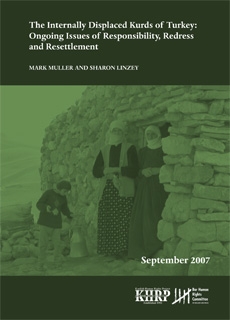| EXECUTIVE SUMMARY
Since early in the 20th century, the position of the Kurds in Turkey has been precarious. This was particularly so during the 1980s and 1990s when state security forces forcibly evacuated some 3,500 towns and villages in the Kurdish regions of Turkey. Between 3 and 4 million people became internally displaced during this period.
The problem of internal displacement is not unique to Turkey. There are an estimated 25 million internally displaced people (IDPs) worldwide, overtaking the number of refugees. While IDPs are protected to a certain extent by general human rights instruments such as the Universal Declaration of Human Rights (UDHR), the International Covenant on Civil and Political Rights (ICCPR) and the Geneva Conventions, the gravity of the situation prompted a specific international response, resulting in the UN Guiding Principles on Internal Displacement (the Guiding Principles). The Guiding Principles now represent the benchmark for national, international and non-state actors in their interactions with the internally displaced, providing guidelines in relation to each stage of the phenomenon of internal displacement, as well as providing a framework for the consideration of issues of responsibility.
The European Convention for the Protection of Human Rights and Fundamental Freedoms (ECHR) provides some scope for complaints against the Turkish Government and indeed, KHRP has submitted many cases to the European Court of Human Rights (ECtHR) on behalf of Kurds from south-east Turkey who have been forced to leave their homes. However, even where individual IDPs are successful in obtaining a judgment at the ECtHR, they are often left without a remedy as the Turkish Government routinely fails to implement judgments. Therefore, while Turkey is subject to a number of obligations and responsibilities at international law, the international legal regime has so far failed to provide the impetus for significant change to the benefit of IDPs.
Since becoming a candidate for accession to the European Union (EU) in 1999, Turkey has received a greater level of attention from the international community, particularly in relation to its progress towards meeting the standards required for EU membership, including various human rights standards. However, comparatively little attention has been given to the specific issue of the vast number of Internally Displaced Persons in Turkey, and what’s more, there has been no intergovernmental financial or other support structure designated to assist Turkey in addressing this massive humanitarian catastrophe. While Turkey’s progress to date should be encouraged, KHRP believes that the EU must maintain the integrity of its accession requirements, particularly ensuring the full implementation of reforms proposed by the Turkish Government. Without a robust approach to the accession process, it is unlikely that Turkey will develop its human rights standards beyond paper reform.
Since the mid-1990s the Turkish Government has purported to resolve the situation of internally displaced people in Turkey through monetary compensation and limited programmes for return. The most recent of these, the Law on Compensation for Damage Arising from Terrorism or the Struggle to Combat Terrorism (The Compensation Law)1 and the Return to Village and Rehabilitation Project (RVRP) are plagued with legal and practical deficiencies. As a result, NGOs continue to report that the rate of returns is extremely low and returning IDPs receive little governmental support. KHRP’s fact-finding missions to Diyarbakır and Van in 2005 and 2006 confirmed that returns are practically non-existent. Recent information released in the form of the Hacettepe Survey indicates that the number of IDPs in Turkey has historically been grossly understated by the Turkish Government. Significant evidence has also been gathered by NGOs, civil society organisations and the international community to demonstrate the need for a more comprehensive multi-faceted approach to the situation of IDPs.
Those IDPs who do attempt to return are faced with a range of serious obstacles of which the village guard system is of particular concern. As an unregulated armed force, the village guards pose a threat to IDPs on a number of levels. KHRP strongly encourages the Turkish Government to abolish the village guard regime. In addition, most IDPs (whether in the cities or having returned to their villages) experience a lack of public infrastructure, inadequate social services, a lack of education, acute poverty and a climate of impunity that reinforces their disadvantage.
This report provides an overview of the Turkish Government’s programmes for return, resettlement and redress. It also addresses the issue of responsibility, both in the context of the EU and the international community more generally. Finally, we survey the current difficulties facing IDPs in Turkey. It is only by adopting a holistic approach that addresses not only the fact of displacement, but also its causes and its consequences that the Turkish Government will make significant progress on this issue. Without that commitment on the part of the Turkish Government, the future remains bleak for IDPs. The issue of internal displacement retains its critical importance for the Kurds in south-east Turkey, the European Union and the region overall and I believe that this report will assist all those involved in moving forward.
Kerim Yildiz, Executive Director, KHRP | 